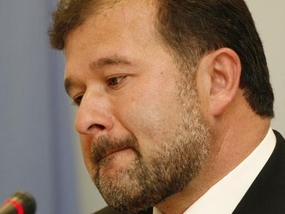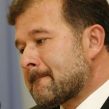
Yushchenko Accepts Resignation of his Aide Baloha
Publication: Eurasia Daily Monitor Volume: 6 Issue: 98
By:

Ukrainian President Viktor Yushchenko has launched a major reshuffle of his team ahead of the upcoming presidential election and a possible early parliamentary election. Yushchenko accepted the resignation of the controversial head of his secretariat, Viktor Baloha, and replaced him with his long-time ally Vira Ulyanchenko -also appointed to chair his party, Our Ukraine People’s Union (NSNU). Baloha who recently quarreled not only with Yushchenko’s rivals but also with his allies, came to be regarded as an electoral liability. Ulyanchenko will try to revive the NSNU and raise funds for Yushchenko’s re-election campaign.
Baloha tendered his resignation on May 12 (Kommersant-Ukraine, May 19). Yushchenko accepted it, characterizing it as part of reshuffling his team ahead of the presidential election. Yushchenko suggested that Baloha might play a role in his election campaign (Delo, May 19).
Yushchenko tried to downplay the extent of conflict between himself and Baloha. The deputy chief of the National Security and Defense Council Stepan Havrysh, said that Baloha’s resignation had been prompted by conflicts between him and "the many political managers who work for the president" (Ukrainski Novyny, May 18). He also blamed Baloha for provoking disputes between Yushchenko and parliament (ICTV, May 18). Baloha declared that he resigned over disagreeing with Yushchenko’s intention to run for a second term. "I am sure that you have no moral right to run for president. I will not help you in this," Baloha said in a statement written in his usual belligerent manner (Ukrainska Pravda, May 19).
The weekly Zerkalo Nedeli suggested that Baloha resigned in protest against what he perceived as attempts to undermine his influence. Baloha’s protégé the deputy chief of the Security Service (SBU) Tibery Durdynets, has been placed on an Interpol wanted list following scandals involving the alleged wiretapping of top prosecutors by the SBU and Durdynets’s refusal to obey court orders to resign. Yushchenko rejected Baloha’s suggestion that his United Center (YeTs) party should replace the NSNU as Yushchenko’s party. Finally, Baloha opposed Yushchenko’s plan to promote Ulyanchenko to chair the NSNU’s political council, apparently viewing her as his main rival in Yushchenko’s team (Zerkalo Nedeli, May 16).
Yushchenko carried out his plan to promote Ulyanchenko. She was elected to chair the NSNU’s council on May 16 and another long-time ally of Yushchenko, Roman Bezsmertny who founded the party in 2005, was elected head of the NSNU executive council. Ulyanchenko did not rule out cooperation with YeTs but she said that the NSNU will now be Yushchenko’s only party. Ulyanchenko’s tasks will include purging its ranks of Prime Minister Yulia Tymoshenko’s supporters, including the NSNU parliamentary caucus leader Mykola Martynenko, and gathering the funds needed for the party to fight the election (Ukrainska Pravda, May 18). After Yushchenko’s election as the NSNU chairman late last year, several prominent businessmen withdrew their sponsorship. The NSNU suddenly became so underfunded that its regional branches could not even afford to pay for electricity and telephone.
Ulyanchenko, who will continue to serve concurrently as Kyiv Region governor, reportedly has good relations with several Ukrainian "oligarchs" – the most politically influential businessmen – including Rinat Akhmetov from the Party of Regions (PRU) and Tymoshenko’s allies Vitaly Hayduk and Bohdan Hubsky. Apart from fundraising, her remit may also include forging links with Yushchenko’s rivals. Her peaceful style contrasts with Baloha’s controversial behavior. It is widely believed that Baloha provoked several of Yushchenko’s conflicts with former prime minister Viktor Yanukovych, as well as his successor Tymoshenko.
Baloha has also proven undiplomatic in his foreign policy statements. For example, he threatened that the country will re-introduce visas for the EU if it failed to liberalize its visa regime for Ukraine (EDM, April 3). This statement was counterproductive, delivered ahead of the crucial May 7 EU Eastern Partnership summit.
Even without Baloha, it might be difficult for Yushchenko to persuade Ukrainians to vote for him, as his popularity has declined from over 50 percent in 2004 (when he became president) to under 3 percent. Yet he has time to improve his standing. On May 13 the constitutional court ruled in his favor in a dispute with parliament over the presidential election date. The court said that parliament’s decision to schedule the election for October 25 was illegal (Channel 5, May 13). Parliament now has to propose a new election date. It will most likely be held in late January 2010, allowing Yushchenko’s team three more months to restore popular trust.
Yushchenko remains optimistic that in Baloha’s absence his team can successfully restore the image of the president and the party. Addressing the NSNU council on May 16, he repeated his earlier idea that the presidential election should be held concurrently with early parliamentary elections, which is currently dominated by a loose coalition led by his arch-rival Tymoshenko (Ukrainska Pravda, May 16). Nonetheless, the chief judge of the constitutional court Andry Stryzhak, said that Yushchenko has no legal grounds to disband parliament and call new elections (ICTV, May 17).




